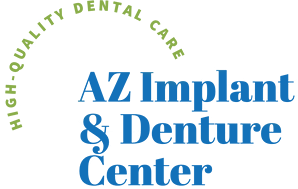How Do You Know if Dental Crowns are Best for You?
Are you considering dental crowns to enhance your smile or address dental issues? Our dentist in Sun City West understands the importance of making an informed decision when it comes to your dental health.
Explore the benefits of dental crowns, along with some of their disadvantages. Whether you’re seeking cosmetic improvement or restorative treatment, AZ Implant & Denture Center has what you need. To schedule an appointment with our board-certified dentist, contact our Sun City West dental office today at (623) 214-7898.

The Benefits of Dental Crowns
Enhanced Aesthetics
One of the primary benefits of dental crowns is their ability to enhance the aesthetics of your smile. If you have discolored, misshapen, or severely decayed teeth, dental crowns can provide a natural-looking solution. Our dentist will ensure that your dental crowns perfectly match the color and shape of your natural teeth, resulting in a seamless and beautiful smile.
Reinforcing Weak Teeth
Severely decayed teeth or those with large fillings may lack sufficient structure to withstand biting forces. A crown encases the tooth, providing much-needed reinforcement and preventing further damage or breakage.
Safeguarding Cracked Teeth
Cracks compromise the integrity of a tooth, leaving it susceptible to further fractures and potential loss. A crown encases the cracked tooth, binding the fragments together and preventing the crack from worsening.
Versatility
Dental crowns are versatile and can address a wide range of concerns. Whether you have a cracked or broken tooth, a large filling, or a dental implant, a crown can be customized to fit your needs. There are also multiple types of dental crowns, including metal crowns and porcelain crowns.
Support for Dental Prosthetics
Dental crowns are often used to support other dental prosthetics like dental bridges and dental implants, adding to their stability and functionality.
Preserving Root Canal-Treated Teeth
Root canals remove the pulp, leaving the tooth somewhat brittle. A crown placed over a root-canaled tooth safeguards it from fracturing and ensures its long-term health.
Improved Oral Hygiene
Crowns create a smooth, seamless surface that makes brushing and flossing easier, promoting good oral hygiene and reducing the risk of future tooth decay.
Prevents Teeth Shifting
If you have a missing tooth, the surrounding teeth can shift to fill the gap. A crown can be used in conjunction with a dental implant or dental bridge to fill the gap and prevent teeth movement.

Possible Disadvantages of Dental Crowns
Sensitivity
After the placement of a dental crown, some individuals may experience temporary sensitivity to hot or cold substances. This sensitivity typically subsides within a few weeks as the tooth adjusts to the permanent crown. Dr. Cooper will guide you through managing any discomfort during the adjustment period.
Risk of Decay
Although dental crowns are designed to protect teeth from further decay, there’s still a risk of tooth decay at the crown’s margin, where it meets the natural existing tooth. Maintain good oral hygiene practices, including regular brushing, flossing, and dental check-ups, to prevent any potential decay around the crown.
Removal of Natural Tooth Structure
To accommodate a dental crown, a portion of the natural tooth structure must be removed. This irreversible process means the tooth will always require a crown to maintain its strength and appearance. We’ll evaluate your dental situation and discuss the necessity of removing natural tooth structure before proceeding.
When to Consider a Dental Crown Alternative
While dental crowns offer many cosmetic benefits, they may not always be the most suitable treatment option. Here are a few instances where alternative treatments may be considered:
- Minor tooth damage
- Orthodontic needs
- Cost
- Tooth loss
Frequently Asked Questions
Yes, food particles can get stuck under a crown. While a properly fitted crown should create a seal around the underlying tooth, it’s still possible for small food particles to become trapped between the crown and the tooth, leading to discomfort or gum irritation. Regular brushing, flossing, and rinsing with mouthwash can help remove any trapped food debris.
There are situations where a tooth may not be suitable for a dental crown. Some of these instances include:
- Insufficient tooth structure
- Severe gum disease
- Tooth mobility
- Inadequate bite alignment
Crowns can withstand the forces of chewing and biting more effectively, helping protect and preserve the underlying tooth. Your dentist will consider factors such as the location of the tooth, the amount of remaining tooth structure, and your individual needs when determining whether a crown or filling is the most appropriate treatment option for you.
Make an Informed Decision About Your Oral Health with Dr. Cooper
Now that you know more about the benefits of dental crowns, are you ready to schedule your appointment? Our Sun City West board-certified dentist is here to help you determine which dental restoration best meets your smile goals.
Contact our dental office at (623) 214-7898 to schedule your appointment today.

